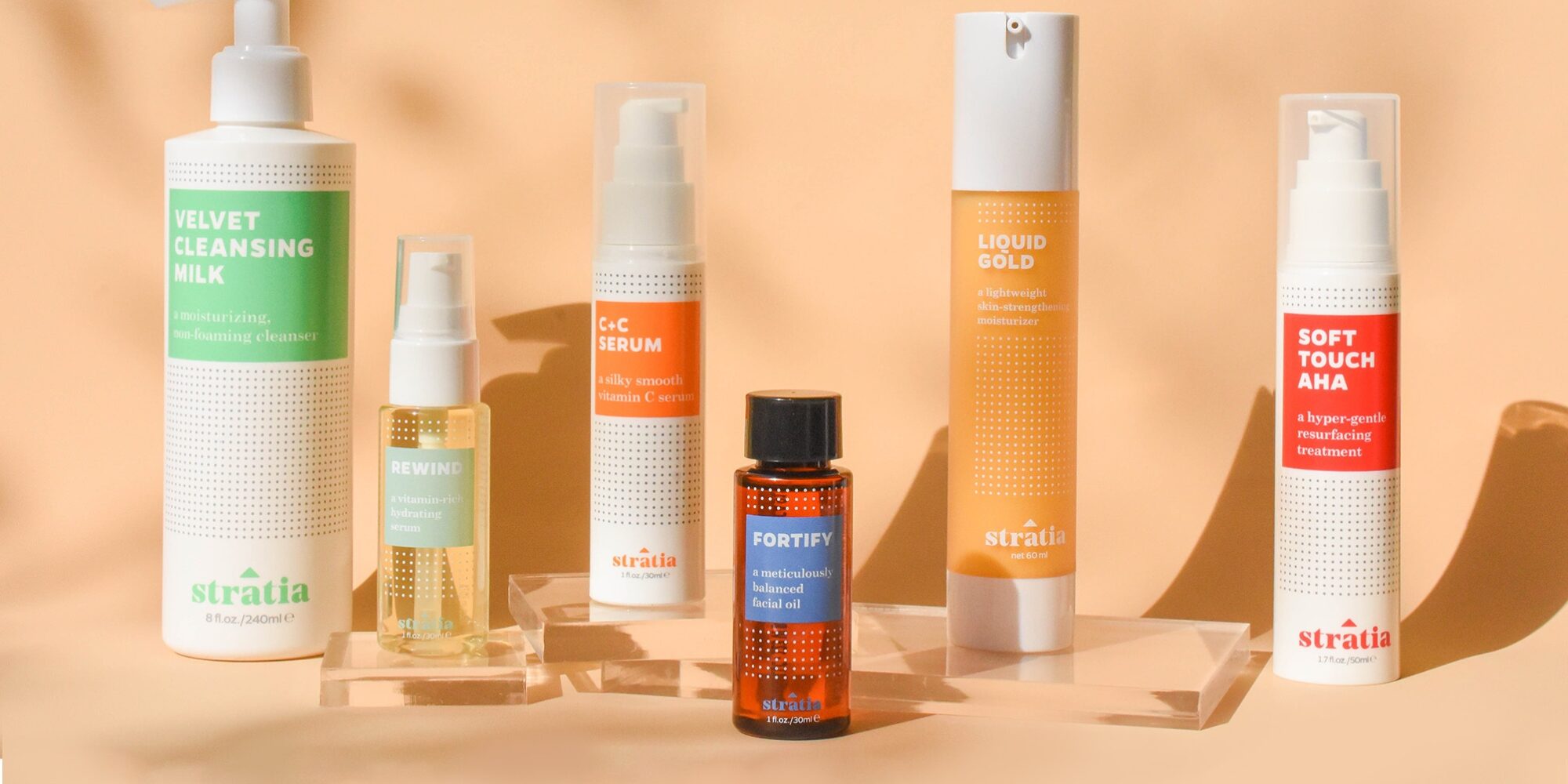
Is Stratia The Next Paula’s Choice?
This skincare brand started in direct-to-consumer distribution has fervent fans and serious skincare formulations built on proven ingredients. The description fits Paula’s Choice, but, in this case, Stratia is the subject of it. Launched with $3,000 by Alli Reed, an ardent skincare tinkerer and Redditor, in 2016, more than 20 years after Paula’s Choice, it shares many of the assets that made the preceding brand attractive to Unilever, which revealed last month it’s acquiring Paula’s Choice: affordability, community and transparency. Stratia is far from the size of Paula’s Choice—it’s on track to surpass $4 million in sales this year, up from roughly $2.5 million last year, compared to closing in on an estimated $300 million in 2021 sales—but it’s beginning to take steps that Paula’s Choice took (retail expansion and external investors are possibilities) to become a significant beauty industry player. Reed is keenly aware those steps could have downsides for Stratia. “The worry I have—and it’s something that gets reflected in a lot of horror stories from people that have taken on investment—is that the investor doesn’t get it, that they seem like they get it and they really don’t,” she says. “My biggest fear is bringing on someone who will push for Stratia to lose its soul.” Beauty Independent talked to Reed further about fundraising, rejecting major retailers, operating in a crowded skincare segment, marketing effectively and why she’s rooting for a parabens comeback.
What was it like when you first started formulating?
I have a chemistry background that I wasn’t using in my [advertising] career, and I was really missing lab time, which was always my favorite part. That was on the one hand and, on the other, I wasn’t getting enough information about the skincare products I was using. How were they formulated? Were the ingredients at the right percentages with the right vehicle formula? So, I decided to start formulating my own. You can learn how to do anything on the internet. There were communities about formulating your own skincare in a very scientific way. I initially started out by trying existing formulas and moved on by teaching myself to reverse-engineer my favorite products.
Then, I started coming up with my own formulas. The way I formulate, I try to have a specific goal in mind, whether it’s that I want something that’s anti-aging or that features retinol. I had plenty of fails along the way. Formulating skincare is all trial and error. Eventually, I had a couple of formulas based off of peer-reviewed research I had read, and they were products I didn’t really see anywhere else on the market. That’s when I had the idea that maybe I could sell this.
The first formula was Liquid Gold. I was basing it off of a study I read about the ideal ratio of ceramides, fatty acids and cholesterol for skin barrier repair. In an excel spreadsheet, I played around with a way to recreate the exact ratio and added other ingredients for barrier repair, and made the final formula lightweight because I wanted it to be something that people with oily skin could use. So, I found the right emulsifier that didn’t feel greasy. I made sure it was in service of barrier repair, and it’s for all skin types. It helps me ignore a huge range of potential ingredients when I focus on the goal.
Today, Stratia has seven products priced from $15 to $28. How did you price the products to start?
This is still how I do it. I took the raw cost of goods sold—the ingredient costs, the bottle and the label—and multiplied it by an internal multiplier to take into account my time, the fees of being on Shopify and shipping. Everything ends up being really affordable because it’s in-house. We are shipping directly to customers, so we are not losing half of the profit to a retailer. When I formulate, I’m not thinking about budget constraints. I’m just getting the highest quality ingredients and putting them in the formula to be their most effective. Then, I figure out the cost based on that, and it’s all surprisingly affordable.
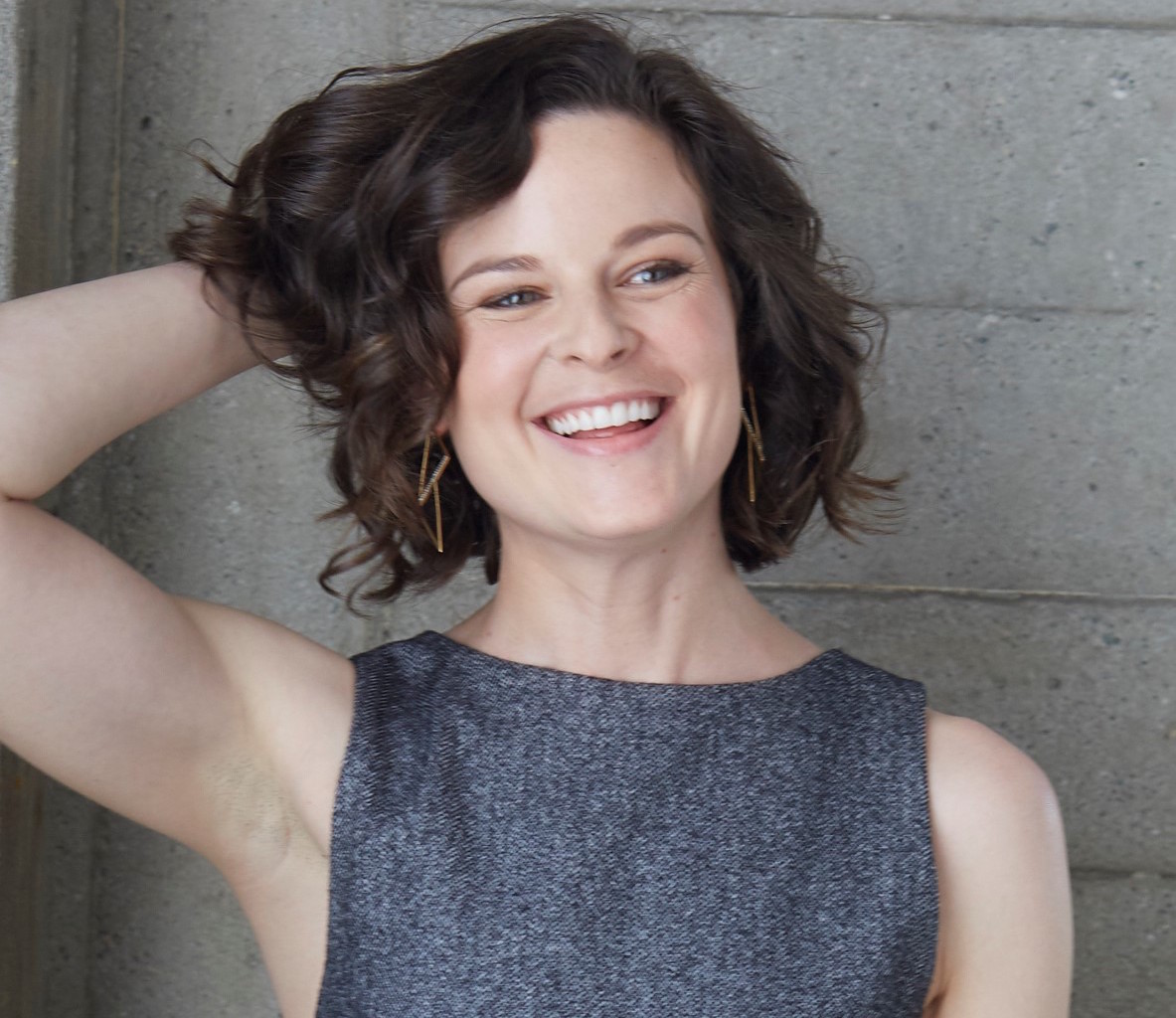
You didn’t start marketing the brand until 2019, why?
I only ever expected this to be a side hustle, something I would do on the weekends. I was flat out trying to keep up with it. I had a full-time job. I ended up quitting it six weeks before my 401k would have vested because I literally couldn’t do another day of doing two jobs at once. Stratia was taking up so much time that I barely had time to sleep. When a new influencer posted about Stratia and how they loved it, there was part of me that was excited and part of me that was like, “Come on, man.” That is why it took me so long to pursue growth. It wasn’t until 2019 that I could lay down the foundation to keep up with the growth that we were having, including hiring someone to take on marketing and expanding manufacturing capacity.
What marketing tactics are the most effective?
We have always been cash-flow funded. We don’t have other people’s money to play around with. We have tried Facebook ads, influencer campaigns, email marketing, just small ways to see what resonates by iterating, analyzing and improving. A real hurdle for selling skincare online is it’s hard to figure out if a skincare product is going to work for you. With makeup, you can show swatches. With clothing, you can show a model moving around in it. With skincare, you can only really describe it. What has been really effective for us is that we have such a passionate fan base of people who have tried our products. We utilize people’s reviews, and we never have and never will pay for a positive review.
So, we just make sure that customers can trust what they hear about the product. Utilizing those reviews in the UGC in our paid advertising works a lot better than us saying, “Hey, this product is great.” Another thing that has really helped is the level of transparency that we have because we manufacture in-house. We can show people what it looks like when their skincare is manufactured. We can show them the entire process. That has built trust and interest in new customers because it’s really unusual to see the emulsification stage of your moisturizer.
How comfortable do you feel on social media?
I am not a social media person personally. I always forget to post. On my Instagram, I post maybe twice a year. I’m a lot more active on Stratia’s social media. I feel more comfortable with that because I’m sharing my unique experience and expertise. I’m opening a line of dialogue with our customers. I’m forcing myself to get more comfortable. We have a social media manager on staff who figures out the strategy. She’s like, “Alright, tell us some stuff about summer,” or she says, “Let’s do some ingredient spotlights.”
She’s an expert in social media, not necessarily skincare formulation. She gives the broad category, and I will give specific research. COVID has been especially hard for that because we’ve all been distanced. I’ve never met my social media manager in person. We are moving into a new office, and we are all working in person there. Hopefully, it will be easier for her to come up to me and say, “OK, answer this question on TikTok.” It can be a lot less planned out.
What has been your approach to wholesale?
The New London Pharmacy is the only physical place to buy Stratia, and we’ve been there for four years, almost since Stratia launched. They approached us. They heard about Stratia online. I figured it’s an independently owned really cool spot that focuses on hard-to-get skincare. It seemed like the perfect way to dip my toes into retailing because, at that point, I didn’t know if I wanted to stay DTC or expand into retail. Since then, I’ve put more of my weight on the DTC side.
I think retail could potentially be an opportunity in the future, and we have been approached by most of the major retailers. I don’t want to be one of the 100 indie brands that they bring on and churn through to find the three that work. I want to wait until Stratia has grown a significant fan base, market share and brand awareness so that it’s really a partnership with the retailer I end up partnering with, and I’m bringing a lot to the table as well.
The indie beauty brand landscape has exploded since you started Stratia. Has that impacted it?
Yes and no. The explosion I think has primarily been “clean beauty,” which is not the field we play in. It’s tough because Stratia is hyper focused on making extremely safe and effective skincare that really is better for you, and I think a lot of “clean beauty” traffics in fear mongering and marketing. I think, by differentiating ourselves so distinctly from that movement, it has helped us to not compete against the vast majority of that market explosion.
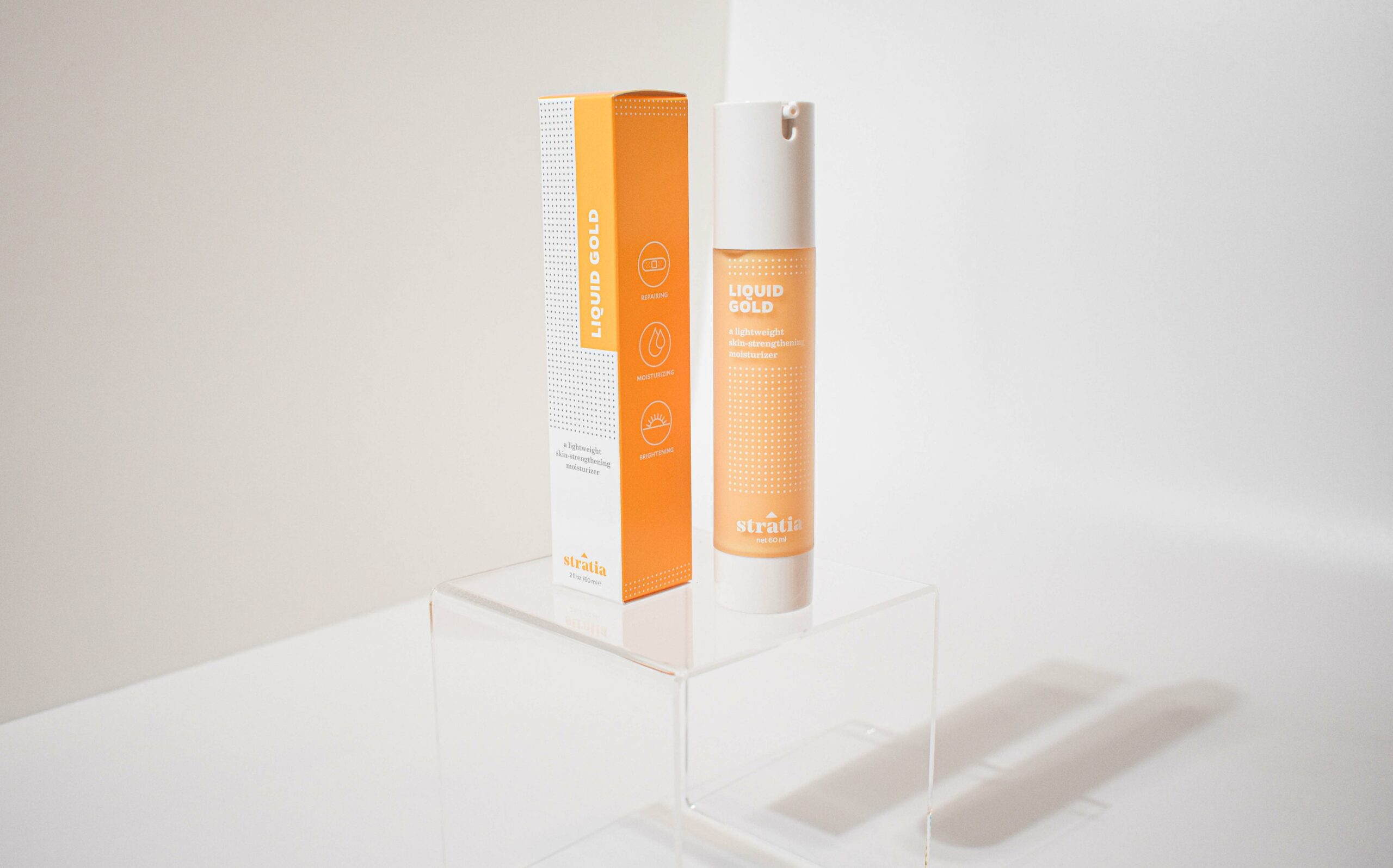
There’s also been ingredient-focused brands like The Ordinary.
I’m actually really grateful for that. When I started, The Ordinary and Paula’s Choice were around, but that was it in terms of science-first skincare, at least on the affordable side. The growth has helped educate consumers on what an INCI list is, what ingredients do, to look for certain ingredients in their skincare and to really question, “Is this at the right percentage? Is there real research behind this ingredient?”
We actually face less of an education hurdle now than we did five years ago because a lot of these brand and the influencers reviewing them have helped to create a better educated skincare consumer. My goal is to create better educated skincare consumers overall. I think, once you have knowledge, you will choose Stratia and, if not, that’s fine, too, but people who are learning a lot about ingredients and formulations will see how well-formulated Stratia’s products are.
If there’s one thing you want consumers to take away from what you’re teaching them, what would it be?
My philosophy on formulating comes down to an idea that your skin is an ally rather than an enemy. I think a lot of products now are about 30% acid and burning off acne, but, just looking at the way the skin functions as a biological organ and the way skincare interacts with it, treating your skin gently and going slow is going to yield better results than viewing your skin as an adversary and trying to beat it into submission.
You use parabens in your products and are an advocate of them. Do you think they should make a comeback?
Absolutely. We are launching a YouTube channel shortly, and I just recorded a video on preservatives focusing on parabens. Parabens are so misunderstood. The negative associations with them in terms of breast cancer are based on one misconstrued and debunked study from 2004, and the endocrine disruption involved with injecting pure parabens into rats is 1,000 times weaker than estrogen and, regardless, that’s not how parabens are used in cosmetics.
Your skin’s role as an organ is to keep things out. These things don’t enter the bloodstream in any significant percentage. Parabens are effective in smaller percentages than modern replacement preservative systems. They are non-irritating, which is unusual for preservatives. They are so much more effective than any other preservative, which not only means keeping a product safe from bacteria, mold and yeast, a major concern, but you can also use a wider array of ingredients. A lot of the ingredients that benefit the skin like botanical extracts and proteins feed microbes so a weaker preservative system can’t handle them. You end up with less effective skincare if you use less effective preservatives.
If you could make changes to the beauty industry, what changes would you make?
I really like the EU cracking down on free-from claims because they inherently imply there is a reason to be free from, that there is something wrong with parabens, for example. I would like to see better codified constraints around claims that are not backed up by science. I would really love to see less fear mongering because people have a really genuine understandable fear of causing harm to themselves and loved ones, and I really hate how many brands use that as a way to sell their products.
You recommend sunscreen all the time, but Stratia doesn’t have one. What do you use, and will you sell one?
I personally use EltaMD UV Clear 46. It’s my favorite. It feels nice. It has great protection. I absolutely want to make a sunscreen, and I also really want to take my own shortcomings as a formulator into account. There are cosmetic chemists who only formulate sunscreen because it’s so hard to do. UV filters really want to clump up in the formula and the whole point of them providing protection is they are evenly dispersed. They are just really tricky to formulate, stabilize and make sure they are providing as much protection as possible.
I really do want to launch a sunscreen, but I won’t be the person to formulate it. Since I have formulated all the products so far, it’s a new undertaking to look to bring on a chemist to formulate a product for us. I feel such an incredible obligation to our customers, especially with the scandal around SPFs testing so much lower than they have stated. That’s not, oh no, you are going to get a wrinkle, that’s a risk of skin cancer. I want to make sure we are taking it very, very seriously.
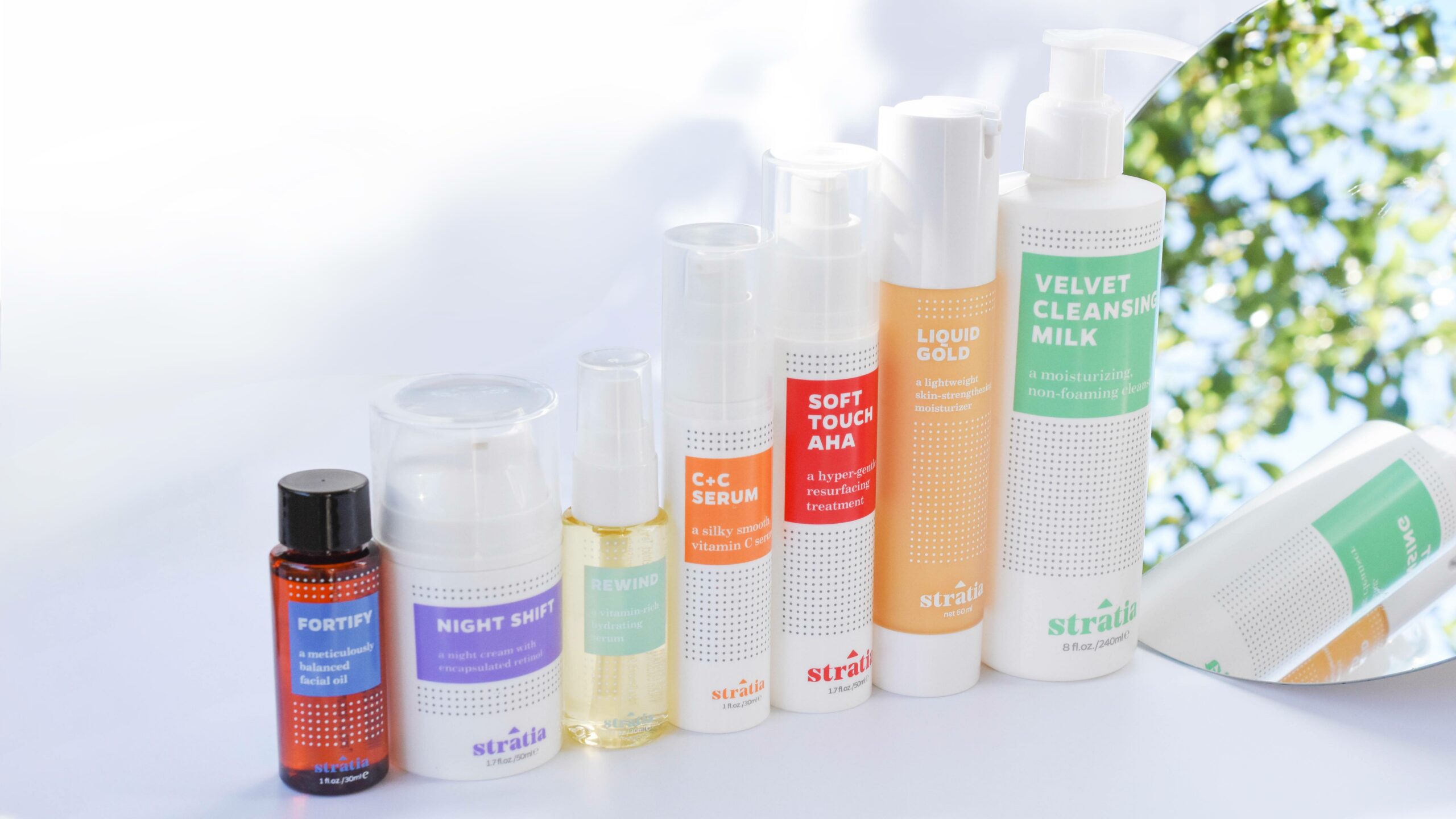
How do you come up with new products?
I’m really plugged into the skincare community and hearing what they want, what they like, what they don’t like, what they think is missing. I also just look at gaps not only in our own product line, but the market as a whole. What are some skin concerns that are being under-addressed or that I could address in a different way? I have definitely had a few products where I felt like I had a great idea, and it was a new type of product. Then, I tried to make it and figured out why no one had made it because it might be impossible to make stable.
It will often be at least 50 different prototypes I will go through trying to find the best version. When I am formulating a new product, I have a list from my blog of about 1,000 volunteers who have signed up to test out prototypes. I will make a batch of a prototype, send out an email to see who wants to try them on a first-come, first-serve basis, and they get claimed within 60 seconds. The product has to be tried out in 30 days, and I send a full survey. That way know I know, when I launch a product, it doesn’t only work on my face, it works on hundreds of different faces. I account for all skin types, tones and ages.
While Stratia is a DTC brand, it doesn’t seem like the DTC brands described by Kyle Chayka in The New Yorker that have a millennial aesthetic, but little else to recommend.
From being a part of a lot of groups online and networking groups of DTC brands, a lot of the questions are around hacking performance marketing and SEO tactics. The question that is never asked is: Is your product good? I think a lot of the pushback against that I have seen is that, at the end of the day, it’s an AliExpress product that is being marketed slickly. Stratia is the antithesis of that because we are product-first, and it’s about making sure we are forever product-first and that our products really work. Almost half of our first-time customers come back to repurchase. DTC is a way to keep our prices down while we are growing and make sure we can be efficient, but it’s not the end-all-be-all of our strategy. Our strategy lies in product.
How do you manage Stratia’s growth?
It’s really tricky, and there’s not a lot of playbooks I can rely on being a CPG company that is bootstrapped. There aren’t a lot of us out there. So, growth means any profit gets reinvested back in, but that’s as much money as we have to spend. I got feedback from someone in the industry saying, “Geez, you are going to hit $4 million this year after 5 years, that’s incredibly slow.” It’s incredibly slow if we had millions of dollars to kick-start it from the beginning, but we didn’t. That means we have to be incredibly strategic. That involves small tests to make sure what we do is resonating and, also, we have scrappy ways to do things like this YouTube channel is a lot cheaper than buying Facebook ads, and we could have an impact by providing a genuine resource for people. We try to find more efficient, community-based ways to reach people.
Do you think the brand will stay bootstrapped forever?
No, I’ve actually started the process of feeling out the waters of fundraising and seeing what it could look like to align with investors. There is so much potential from getting a cash infusion to really grow customer acquisition, but more important to me would be the advisory capacity, people who have grown CPG companies who know the space and can help me figure out what it looks like to go into retail and expand internationally.
Not to put too fine a point on it, but I have no idea what I’m doing when you come down to it. I’ve never owned a brand or been in the beauty industry, so having people who have experience could be a real benefit. That said, the more I contemplate bringing on investors, the more I’m happy that I don’t have a boss. I don’t have to justify why I do X and Y. For as much as I don’t know about what I’m doing, I really do know what I am doing. I know what is important to the brand and what is not, who we are and who we are not. The perfect answer would be to find a briefcase of money, so that’s still plan A.
What do you make of the path of Paula’s Choice?
I love Paula’s Choice. I think skincare consumers, the one that I know, are all on the same boat, but, talking to people in the beauty industry, they were all, “I don’t really get it. The marketing is kind of weird. The packaging is blah.” But this is what a product-first brand looks like. So, with the acquisition, I feel vindicated being such a big fan. It shows that consumers know what they want, and they want products that work. I really respect the path that Paula’s Choice has taken.
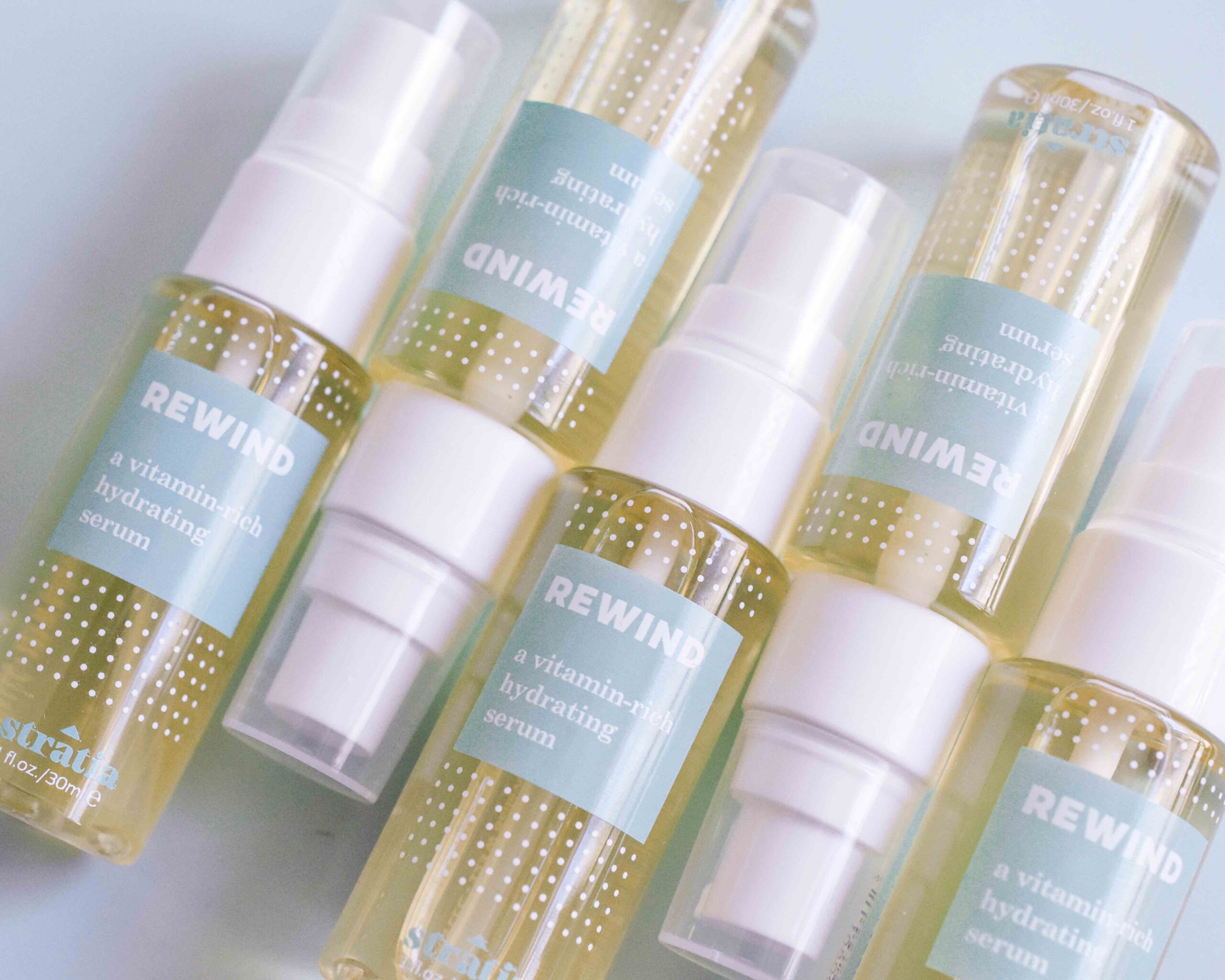
What do you want Stratia to look like in five years?
I think it would look a lot like how it does now, but bigger. We would continue our cadence of one or two products a year. So, it would still be a pretty streamlined product line, but it would maybe expand into other areas of skin like body care or scalp care, but still focused on the skin because that’s the only organ I know. I could see a version where we are strictly DTC, and I could see a version where we are strategically partnered with retailers to reach people who don’t shop online. I also would really like Stratia to be an educational resource, to be a place where people learn about skincare ingredients, how their skin works and what they can expect from their skincare. But, at the end of it day, it would look like a scaled-up version of what we have today.





Leave a Reply
You must be logged in to post a comment.